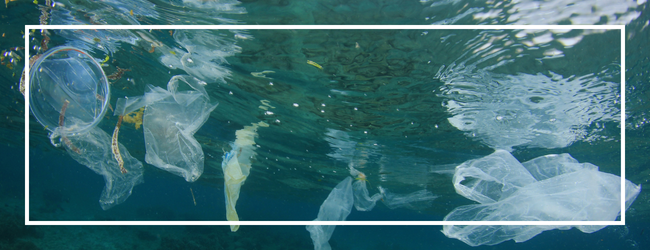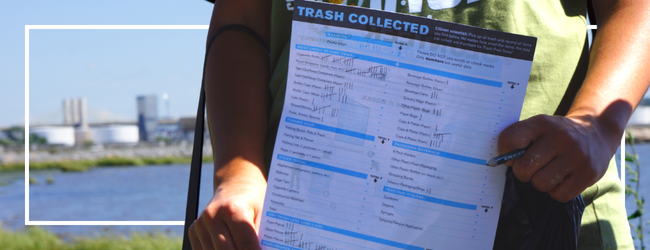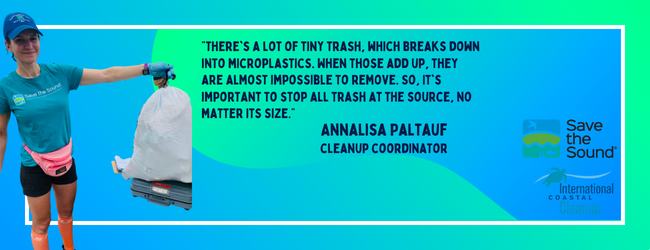As part of Save the Sound’s commitment to reducing plastic waste in our rivers and streams, our Climate and Policy interns, Nicole Freitas and Prabisha Bhandari, have written a four-part blog series focused on plastic reduction through local initiatives and policies. The key findings of this series will inform equitable and effective decisions on reducing single-use plastic to bolster our efforts in supporting clean and sustainable communities.

Save the Sound hosts yearly cleanups in Connecticut. Since 2002, Save the Sound has coordinated Ocean Conservancy’s International Coastal Cleanup in Connecticut for 20 years. The intent of the Connecticut Cleanup is to engage coastal and inland communities to remove trash from beaches, waterways, and parks, preventing pollution from entering Long Island Sound.
As part of the cleanup organization, Ocean Conservancy sends out forms to volunteers for recording data regarding the trash they collected. This allows Save the Sound to track trends across the state. Our cleanup data shows the impact the program has made. From 2008 to 2019, a total of 17,054 volunteers have helped collect 124,063 pounds of trash. We typically share this data at the end of each year through a virtual webinar. However, copies of the most recent data are available to the public at any time upon request.

The data that the volunteers gather highlights the issue of single-use plastics and their ability to infiltrate into our green spaces. Save the Sound’s research shows that Connecticut’s top trash type found during these cleanups are cigarette butts, at a total of 75,558 between 2017 and 2019 alone. Cigarette filters are made of a plastic called cellulose acetate, which contains hundreds of toxic chemicals that are not biodegradable and harmful to both human and wildlife health. Regardless of their small size, cigarette butts present a serious threat to us and our environment due to the toxins released. Other major contributors of pollution that consistently show up in these cleanups are plastic pieces, food wrappers, plastic bottle caps and bottles, foam pieces, and straws.

Trash data recorded during cleanups is essential for identifying most common trash types and ways to eliminate that trash. The data then bolsters our efforts in identifying what policies have already enforced reductions of certain plastics. After the plastic bag bans that occurred mid-2021, there was a significant drop of foam, plastic bags, and straws found at the cleanups, likely due to the decreased usage in restaurants and businesses. However, COVID-19 caused more individuals and businesses to seek out disposable PPE and single-use containers, which was reflected in cleanups. Luckily, the numbers did not reach as high as previous years, indicating that these cleanups and policies have helped in the fight against pollution. After 2021, Save the Sound’s internal cleanup data indicates that plastic trash has decreased. However, trash travels where people travel and we still pick up hundreds of pounds of trash each year. These cleanups do provide local communities with tangible methods of reducing plastic and other kinds of waste in their environment. The data helps us understand trends that inform our solutions-based efforts.
Annalisa Paltauf, volunteer coordinator at Save the Sound, admires the immediate change that is produced through these cleanups. She highlights that it is important to recognize that trash travels—trash can end up in a storm drain that leads to the beach and eventually travels into Long Island Sound. She hopes to get more youth involved in the cleanups and to continue encouraging the involvement and commitment of these volunteers, who inspire and lead with action in support of our Long Island Sound. Those interested in volunteering in this year’s Connecticut Cleanup happening in September and October should register their interest here. Stay tuned for updates throughout the season on social media and our website.

